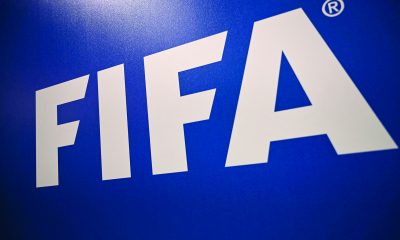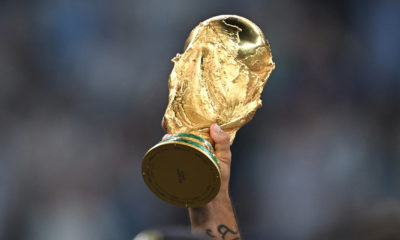
German football fans have vowed to continue protests against an investor deal struck by clubs which have resulted in delays to dozens of matches as fans litter the pitch with tennis balls and chocolate coins.
The throwing of the objects has resulted in long interruptions, with some games coming close to being postponed entirely.
The protests are in response to a plan from the DFL, the association of German clubs which organises the Bundesliga, to sell off an eight percent share of future TV rights in exchange for capital injection to help market and promote the league internationally.
In December, a proposal to “secure long-term and sustainable success” was passed by a two-thirds majority of German clubs.
Fan groups have called for another ballot, arguing the deal—passed less than a year after a similar proposal was rejected—lacked transparency and was undemocratic.
Despite excellent stadium attendances and a strong domestic broadcasting contract, international interest in the Bundesliga lags behind that of England’s Premier League or Spain’s La Liga.
International revenue has become a crucial source of financing in England, for example.
“The aim is for the Bundesliga and Bundesliga 2 to continue to be competitive in sporting and commercial terms,” the DFL said.
‘Suspicious of over-commercialisation’ –
German football teams must comply with the ‘50+1’ rule, which ensures member control and restricts the influence of external investors.
The rule is incredibly popular among German fans, many of whom value it more than success on the field.
Journalist Matt Ford told AFP “the general attitude of German football fans is that they’re suspicious of over-commercialisation.”
“That has to do with the social and cultural history of German football.
“German football clubs have always been member-owned, whereas English football clubs have been privately owned since the 19th century.”
Kristina Schroeder from fan organisation Unsere Kurve said: “German football’s member-based clubs make it special.”
She added that the protests sought to re-assert that “members and fans are an important part of football and must be included in far-reaching decisions.”
Protesters argue the vote in December, which took place behind closed doors, made it difficult to determine whether club representatives voted in accordance with direction from their members.
‘Because they work’ –
In February, the second division match between Hertha Berlin and Hamburg was halted for 30 minutes in the second half as fans from both sides rained tennis balls and other objects down on the pitch.
Since then, few games have been spared interruptions.
Oliver Jauer, 43, a contributor to Union Berlin site Textilvergehen, said the protests “have increased because they work.”
The fans believe more is at stake than just a relatively small share of TV rights income.
Jauer told AFP the protests have been a way of “voicing our anger and helplessness against ‘modern football’.”
Union’s 1-0 win over Wolfsburg on Saturday was delayed by 40 minutes, with the only goal coming in the 25th minute of first-half injury time.
The protests are not limited to the politically-engaged ‘ultra’ fans.
Sam Witt, 43, a Union Berlin fan, told AFP “the protests are organised by the ultras but get the support of normal fans, as the entry of an investor would change the sport for everyone.”
Witt said fans were motivated by concerns the 50+1 rule is being eroded, along with changes like VAR and increased advertising.
Ford, the journalist, noted that German fans have succeeded in getting Monday night kick-offs scrapped through similar tennis ball protests.
‘As long as it takes’ –
The successful proposal included several ‘red lines’, including guaranteeing that the DFL, not investors, would control kick-off times and scheduling, as well as maintaining the 50+1 rule.
Ford said fans “suspect those things won’t remain the same.”
On Tuesday, the DFL told AFP subsidiary SID that one potential investor, Blackstone, was dropping out of the bidding process, leaving just one remaining.
The DFL said it was “always aware that the red lines would place high demands on potential partners”.
Ford said there was no sign of the protests stopping.
“(The fans) feel empowered by Blackstone dropping out of the running.”
Schroeder said “as long as the status quo is not reviewed, with a new and more transparent vote, there is no reason to stop protesting.”
Witt said “the protests will continue until we have protected our sport… or until us football fans all turn away in disgust.”

World Cup News
-
FIFA World Cup
/ 4 weeks agoSaudi oil giant Aramco agrees major FIFA sponsorship deal
Saudi Arabia’s state oil giant Aramco and world football governing body FIFA on Thursday...
By AFP -
FIFA World Cup
/ 2 months agoSon scores but Thailand hold South Korea in World Cup qualifier
Son Heung-min scored but South Korea were held 1-1 at home by Thailand in...
By AFP -
FIFA World Cup
/ 2 months agoJapan-N. Korea World Cup game to stay in Pyongyang, JFA says
Japan’s World Cup qualifier against North Korea will be played in Pyongyang as planned...
By AFP -
FIFA World Cup
/ 3 months agoGerman ex-FA bosses on trial over World Cup tax evasion
Three German ex-top football officials went on trial on Monday in a 13.7-million-euro ($14.8...
By AFP

BOV Premier League
Darren Abdilla replaces Mauro Camoranesi as Floriana FC coach

English Premier League
Liverpool confirm Slot will replace Klopp as manager

BOV Premier League
Balzan set to appoint David Rogers as their new coach

FIFA World Cup qualifiers
S. Korea name new caretaker as search goes on for Klinsmann successor

Winter Olympics
Watch: Geisenberger wins sixth Olympic medal to tie luge record




























